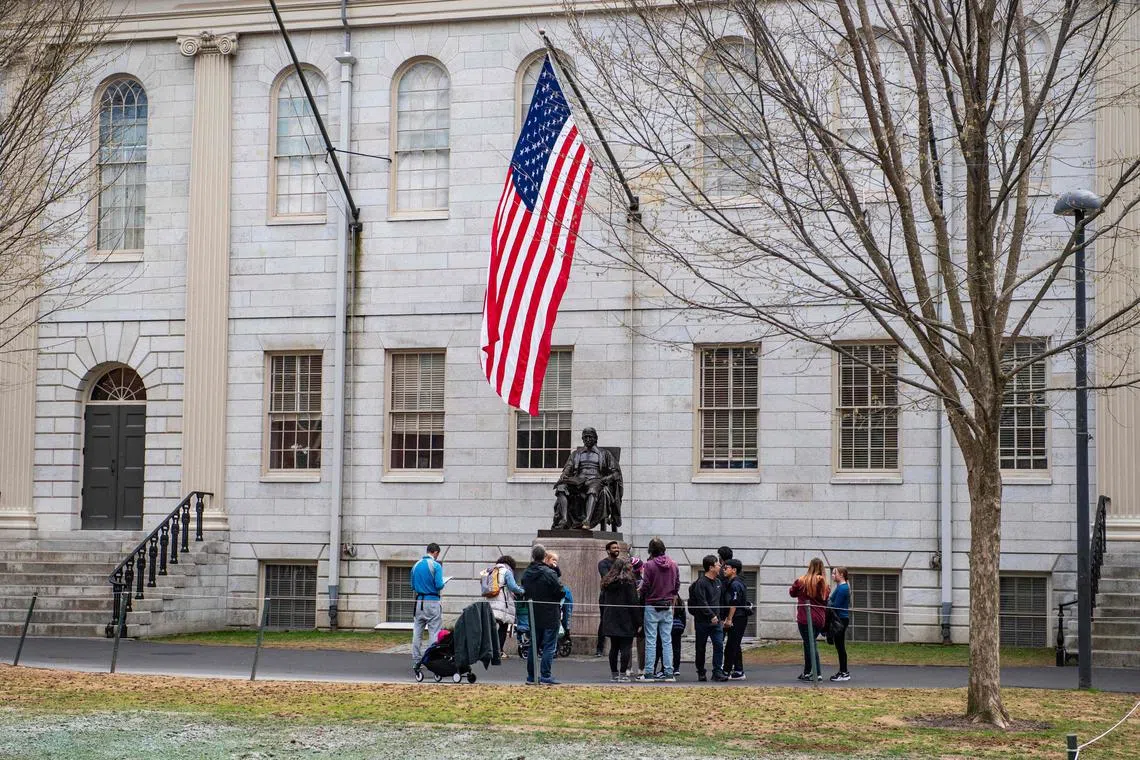As Harvard battles Trump, the university’s president will take a 25% pay cut
Sign up now: Get ST's newsletters delivered to your inbox

The government made a range of intrusive demands of Harvard in April, asserting that the university had, among other things, not done enough to combat anti-Semitism.
PHOTO: AFP
MASSACHUSETTS – Harvard University, which is clashing with the Trump administration over its academic independence and the withdrawal of billions of dollars in research funding, said on May 14 that its president had chosen to cut his own pay by 25 per cent starting later in 2025.
The university has not disclosed specifics about its compensation package for the president, Mr Alan M. Garber, who became Harvard’s permanent leader in 2024. His recent predecessors were paid around US$1 million (S$1.3 million) a year.
Whatever it amounts to in dollar terms, though, the pay reduction is a symbolic gesture compared with the scale of the university’s fight with the federal government, which has already moved to block more than US$2.6 billion in funding for Harvard.
A university spokesperson, Mr Jonathan L. Swain, said Mr Garber’s salary would be reduced starting July 1, when Harvard’s next fiscal year begins. The university, which has already halted new hiring and suspended merit raises for many employees, said that other Harvard leaders were planning contributions to the school.
The university acknowledged Mr Garber’s decision the day after it expanded its lawsuit against the Trump administration.
The government made a range of intrusive demands of Harvard in April, asserting that the university had, among other things, not done enough to combat anti-Semitism. The university has sharply contested those accusations. Then last week, Ms Linda McMahon, the education secretary, said that Harvard would not be eligible for any more federal grants.
Legal experts have cast doubt on the viability of Ms McMahon’s decree, and many of them believe that Harvard has a strong legal case to reverse the cuts the Trump administration has already made. Even so, Harvard, which has routinely received hundreds of millions of dollars a year in federal research funding, is preparing for turmoil as long as President Donald Trump remains in office.
In the first months of Mr Trump’s second term, Harvard has already had to scale back or eliminate some research programmes, including efforts to study tuberculosis, Lou Gehrig’s disease and radiation sickness, because of federal funding cuts.
The university’s T.H. Chan School of Public Health, faced with some of the most significant funding losses, is eliminating desktop phones, limiting catering, reducing security and cutting back on purchases of new computers. The school has also cut back on leased office space, slots for doctoral students and a shuttle that ferries employees between offices.
But Harvard said on May 14 afternoon that it would try to fill some gaps left by the loss of federal funds. In a message to the Harvard community, Mr Garber and Mr John F. Manning, the provost, said the university would spend at least US$250 million in its coming fiscal year to shore up research efforts.
“Although we cannot absorb the entire cost of the suspended or cancelled federal funds, we will mobilise financial resources to support critical research activity,” Mr Garber and Mr Manning wrote, adding that the university would look for other funding sources.
The financial infusion will complement the roughly US$500 million a year that Harvard was already putting towards research projects. Although Harvard has an endowment valued at about US$53 billion, much of the money is restricted and cannot be repurposed at will.
The Crimson, the school’s campus newspaper, first reported Mr Garber’s pay decision. According to Harvard’s most recent publicly available tax filing, Mr Garber earned more than US$1.1 million a year in compensation as provost.
A sense of campus solidarity in the funding fight extends beyond Harvard’s top ranks. Ninety tenured professors have pledged to take 10 per cent pay cuts in order to help Harvard, the nation’s oldest and wealthiest university, weather the Trump administration’s onslaught. Mr Ryan D. Enos, a professor of government and a leader of the group, said the university had expressed its gratitude.
The group came together, Prof Enos said, in recognition that some Harvard employees could be harder hit than others by the federal cuts.
In a statement, the professors, some of whom have not been named publicly, said their offer to work for less pay signalled “our commitment as faculty members to use means at our disposal to protect the university and, especially, staff and students who do not have the same protections”. NYTIMES


